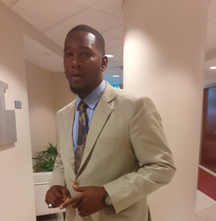“I don’t want people to defend Muslims, I want us all to defend the Constitution. And when I defend women, African Americans, and the LGBTQ community, I am defending the Constitution and I am defending Muslims,” said Virginia State House of Delegates member Sam Rasoul.
Rasoul’s declaration represented the inclusive tone of the “Running on Hate,” session at the historic Muslim Collective Equitable Democracy Inaugural Conference. The session centered on building a multi-cultural democracy in the United States.
Continuing on a similar line of thought at the Washington, DC conference, former Michigan gubernatorial candidate Abdul El Sayed defended his reasons for supporting the legalization of marijuana. “Alcohol is also a drug,” but I don’t hear a call to prohibit its use,” he reasoned.
Cleveland's Basheer S. Jones, the lakefront city’s first Muslim councilperson, says even when Muslim’s have a personal issue with marijuana, to make it illegal further criminalizes African-Americans.
He told the story of how his cousin sold marijuana when it was illegal and got three years in jail, now that marijuana has become legal in several states, he cannot sell the plant because he has a felony. However, now 80 percent of the legal dealers are White men. “That is structural racism,” concluded the African American with deep North American roots.
Another theme of the session was the need for Muslims to become involved citizens. “Make sure you use this energy to make yourself visible,” said United States Representative Ilhan Omar. As one of the most visible of the 435 congresspeople, she urged potential voters to “put your voice in the ballot box!” El Sayed echoed those thoughts by adding that voters are generally telling policy makers, “I will be able to decide my future, not you!”
Interestingly, unlike many non African-Americans without deep North American roots speakers, Jones went beyond quoting deceased Civil Rights leaders to punctuate his point. The third generation Muslim reminded the audience that anti-Muslim rhetoric is limited in African-American communities because of our long, positive history with Islam. To contrast the issue and point of reference differences among diverse Islamic communities, he movingly said, “The only terrorists we know of are White policemen.”
Historic Muslim Conference Focused on Building a Multi-Racial Democracy

However, the New York native stressed the need for recently arrived Muslims to know the history of and include the issues of African-Americans with deep North American roots in their mix. “I don’t mind standing for Syria, Palestine, Egypt, or Somalia, but you must also be willing to stand up for Tamir Rice, Sandra Black, and Mike Brown,” he strengthfully said.
“Make sure you use this energy to make yourself visible,” said United States Representative Ilhan Omar. As one of the most visible of the 435 congresspeople, she urged potential voters to “put your voice in the ballot box!”
Qasim Rashid, who is one of two Muslims seeking to become the first Muslim in the Virginia State Senate says he understands Jones’ position. “Understanding the history of Blacks is critical to removing the hurdles impeding the Black community,” he says.
For instance, the Pakistan native says he is an advocate for felony enfranchisement and economic freedom. “The former slaves were freed, but not economically freed. The powers of Jim Crow put Blacks back into economic slavery and that continues through housing discrimination, employment, salaries, education, health care, and more,” he told Port Of Harlem.
The district he wants to represent, Virginia 28, is where about 15 percent of the population descends from enslaved Africans. Like so many seeking office before him, he said, “If we have a strong turnout from Black voters, then we win the election.”
“Make sure you use this energy to make yourself visible,” said United States Representative Ilhan Omar. As one of the most visible of the 435 congresspeople, she urged potential voters to “put your voice in the ballot box!”
Qasim Rashid, who is one of two Muslims seeking to become the first Muslim in the Virginia State Senate says he understands Jones’ position. “Understanding the history of Blacks is critical to removing the hurdles impeding the Black community,” he says.
For instance, the Pakistan native says he is an advocate for felony enfranchisement and economic freedom. “The former slaves were freed, but not economically freed. The powers of Jim Crow put Blacks back into economic slavery and that continues through housing discrimination, employment, salaries, education, health care, and more,” he told Port Of Harlem.
The district he wants to represent, Virginia 28, is where about 15 percent of the population descends from enslaved Africans. Like so many seeking office before him, he said, “If we have a strong turnout from Black voters, then we win the election.”
Advertisers | Contact Us | Events | Links | Media Kit | Our Company | Payments Pier
Press Room | Print Cover Stories Archives | Electronic Issues and Talk Radio Archives | Writer's Guidelines






